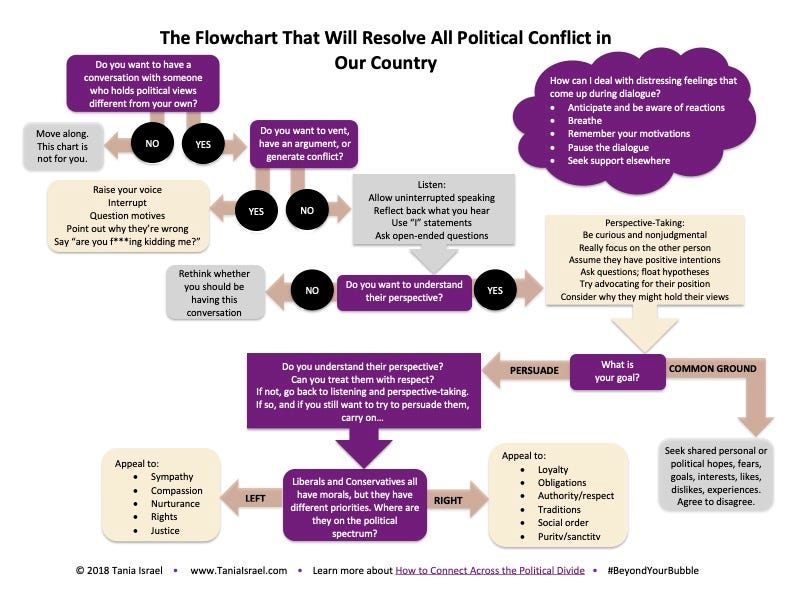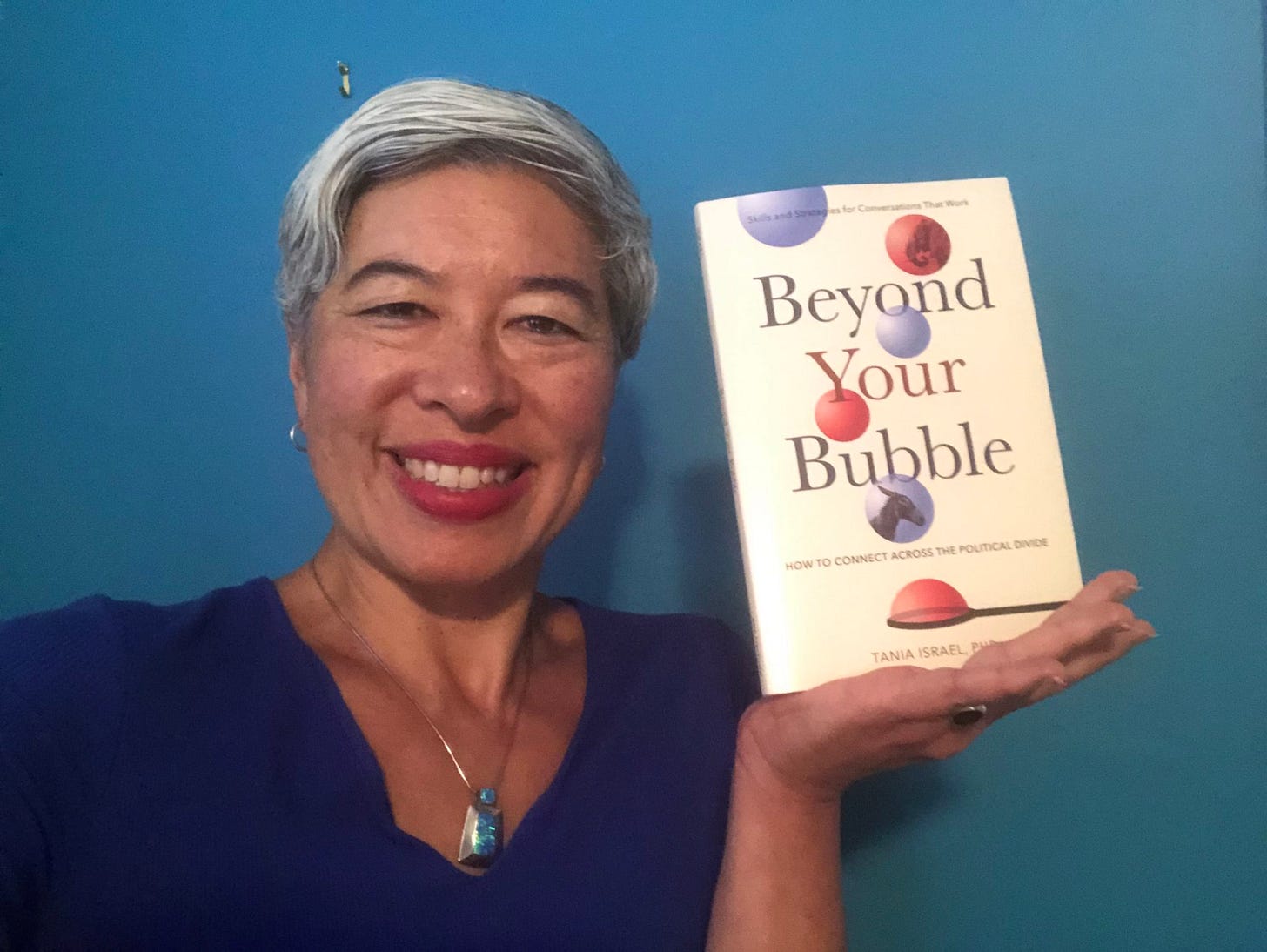How to Go Beyond Your Bubble
Tania Israel shares her transformative tips for effective communication with those holding opposing opinions.

The holidays are upon us, which for many people means uncomfortable conversations over roasted turkey. Heading home to a place where Uncle Vern makes racist jokes, your cousin pops off with a not-so-hot take on the Russian-Ukrainian war, and your mom, despite being told a million times, continues to say things like, “It just doesn’t seem natural” can be extremely challenging to navigate.
Do we shut our mouths? Do we act up, and fight back? Do we eat too much turkey, then pretend to be sleeping until enough time has passed that we can sneak out and head back to our safe bubble?
Fear not, I have some tips that will help.
Well, I have no tips, but I am sharing strategies for surviving family division from the esteemed Tania Israel. She has all kinds of wisdom on how to go “Beyond Your Bubble.” So much knowledge that she wrote a book about it. Last week, Tania (whose name, she told me, rhymes with lasagne) joined my podcast Well…Adjusting to share some tips on how to talk to loved ones on the other side of the political spectrum.
You can find that fascinating episode right here with this little button.
Okay, time for Tania to heal us all just in time for the holidays!
Tips From Tania (like lasagne)
One of the big challenges that we have in this politically polarized environment is that we have ideas in our heads about who those “other people” are. Usually, the ideas in our heads are that the people who disagree with us are extremists and that they are uninformed or misinformed.
It turns out that these are cognitive biases that we have. They’re just flaws in our operating system as human beings, where we tend to view people on another side of something very narrowly and in a skewed way.
So, Correcting our perception of other people can be helpful. Turning down the volume on some of those messages that we're getting through media and social media can be helpful. Then saying, “I really want to understand what somebody's like.” And, “Here I've got somebody right in front of me who can help me to do that.”
So I’m suggesting thinking about them as somebody who can be helpful to you, understanding them rather than seeing them as the opposition. The first thing you need to do is have curiosity. You have to want to understand, and that's got to be a priority for you more than getting your point across.
The next thing you need to do is listen.
You need to pay attention to what they're saying and try to process that. Then, rather than responding with your view, respond with what you just heard them say. Summarize a little bit of something they said back to them, and that's going to make sure that you are paying attention and listening. It's also going to help them to feel like you care and that you're listening.
People often think that they're going to go into a conversation and somebody's going to do a one-eighty and come around. And say, “Oh my gosh, you're right. I was completely wrong all this time. Thank you for those four studies that you cited because that changes everything in terms of the way I see the world.”
It's just not realistic.
The first and probably best goal that we can have is to really, really try to understand someone else's perspective. Some of that is about understanding what their opinion is, but what's even better for perspective-taking is understanding how somebody came to their view, and understanding the values and experiences that informed them. It's not so much about sharing stats and slogans, but it's really about sharing stories.
Certainly, in these conversations, our buttons can get pushed and our emotions can rise. So one of the things that you can do is work on some simple ways to manage your emotions, maintain your equilibrium, and stay in the conversation.
Even taking a few slow, deep breaths is helpful in terms of bringing down our fight, flight, or freeze response. Touch your hand, just a little physical touch, or notice the feeling of the chair beneath you. Any of those things that can bring you back into your body and calm your system and can help you stay present in that conversation.
I honestly think that there's an opportunity in this because the same kinds of skills that are going to help us to have dialogue across political lines are the same skills that are going to help us to be better partners, better parents, better co-workers, and community members.
This is unquestionably a moment of crisis in our democracy with the kind of division and polarization that we have, but it can also be an opportunity for us to deepen our skills and our relationships and strengthen our democracy.
If you’d like to listen to the full episode of Well...Adjusting where Tania appears as our Expert of the Day, click this handy dandy button here.
Tania Israel is a Professor of Counseling Psychology and Associate Dean for DEI at UC Santa Barbara and award-winning author of “Beyond Your Bubble: How to Connect Across the Political Divide, Skills and Strategies for Conversations That Work.” She has shared her expertise on dialogue across political differences on the TODAY show, the New York Times, the Washington Post, NPR, and dozens of other media outlets. Skilled in public speaking and facilitation, Dr. Israel’s work has been received enthusiastically by professional conferences, corporations, campuses, political organizations, and faith communities. Her expertise in LGBTQ psychology has been solicited by the Institute of Medicine, the National Institutes of Health, and the White House; and she has received honors for her research and advocacy from Congress, the American Psychological Association, and the California Asian & Pacific Islander Legislative Caucus. Dr. Israel has two widely viewed TEDx talks (on bisexuality and how to win a political argument), and her innovation and whimsy are evident in her presentations, performances, and other creative projects. To learn more, visit taniaisrael.com or connect with her on LinkedIn, Twitter, Instagram, and TikTok.



